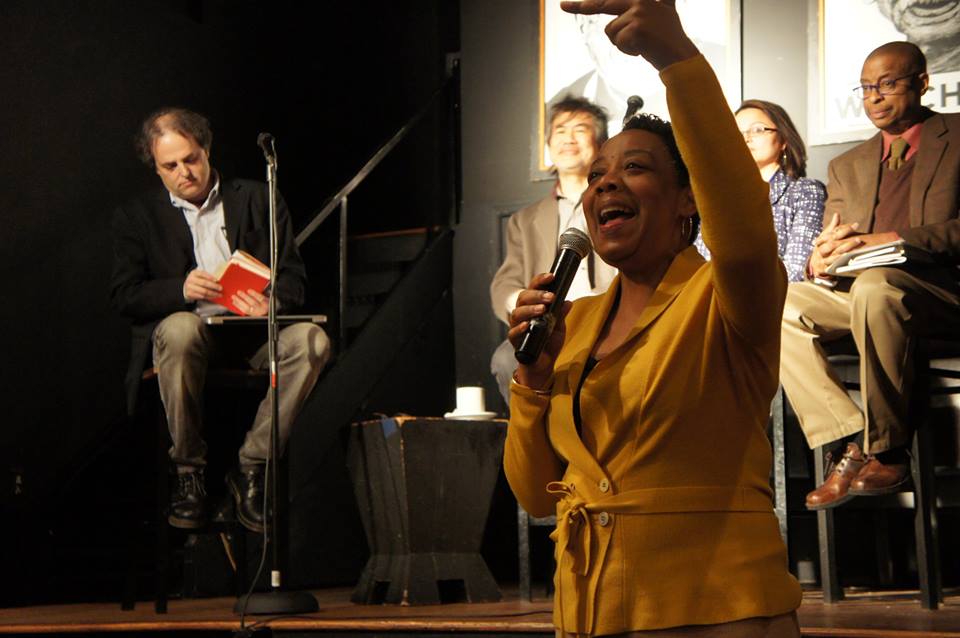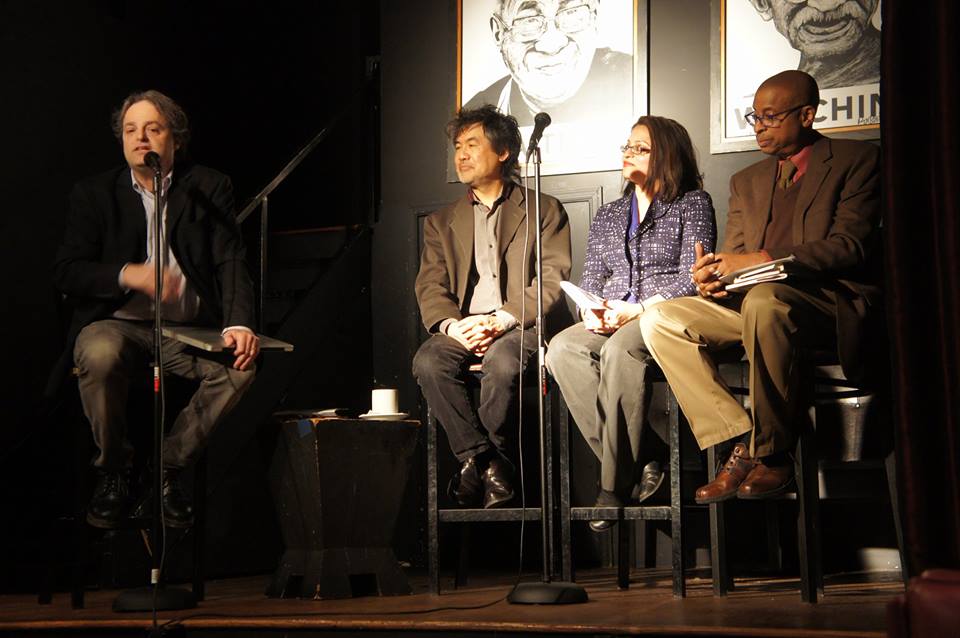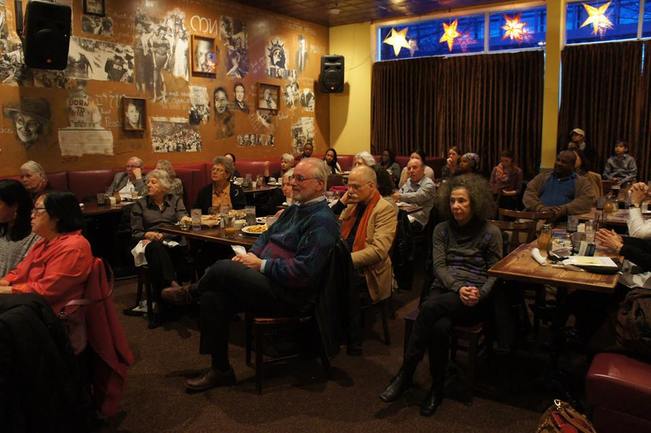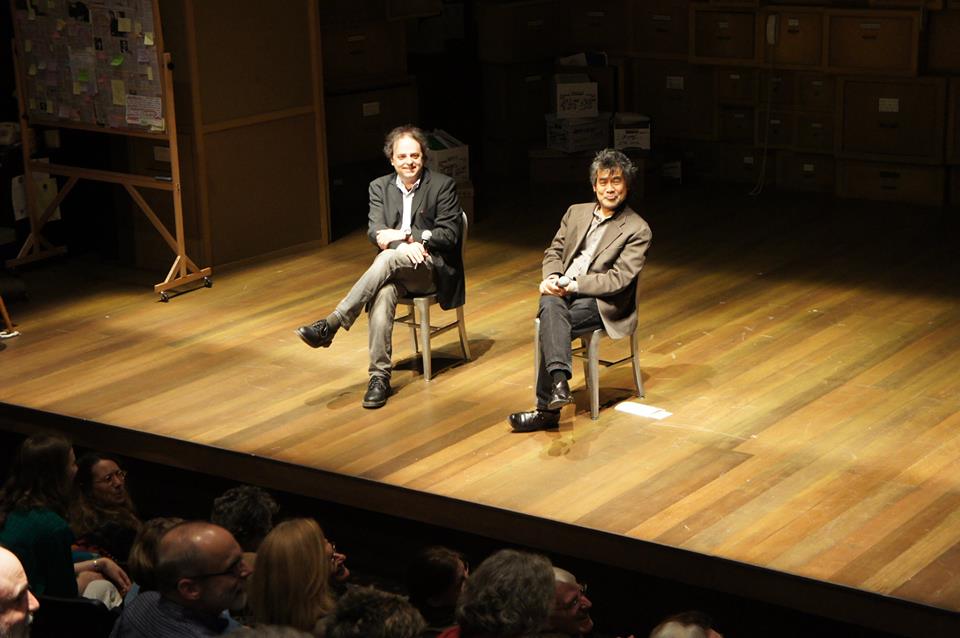A Special Edition of ACTOR: A Conversation with David Henry Hwang and Others about Race and Identity2/13/2014 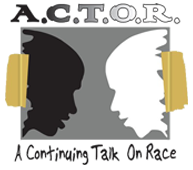 On Saturday, February 1st, Busboys and Poets presented A Special Edition of ACTOR (A Continuing Talk on Race): Conversation with Tony Award-winning playwright, David Henry Hwang about his new play, Yellow Face. Moderated by Theater J's Artistic Director, Ari Roth, additional panelists included E. Ethelbert Miller (poet, educator, and literary activist) and Deepa Iyer (Executive Director of SAALT: South Asian Americans Leading Together). The event was billed as a candid conversation about Race and Identity. 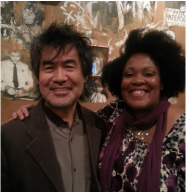 I arrived early for a late lunch with Theater J council member Elaine Reuben. The food is so great, but Busboys and Poets doesn't take reservations. So, I wanted to get good seats up front to take notes and a few photos. David was gracious enough to take a photo with me. I've long admired his work. M. Butterfly cracked open my world. Meeting him and getting to listen to him speak was an absolute highlight. Busboys and Poets Marketing and Events Director, Pamela Pinnock greeted each of us with a warm and rousing welcome. She told us that what made this event even more special was that it was taking place on Langston Hughes' birthday and on the 9th anniversary of Busboys and Poets. We began by paying homage to Hughes and his humble, but ambitious beginnings. While working as a busboy in Washington's Wardman Park Hotel, Hughes gave three of his poems to Vachel Lindsay, a famous critic. Lindsay was impressed by what he read and introduced Hughes to publishers and thereby launched the young poet’s career. Hughes would go on to be a noted writer of novels, short stories, poems and plays. Hughes traveled throughout his career and spent a great deal of time in both Japan and China. This got the attention of the U.S. Government, which was concerned about the communist activities of its citizens, and so Hughes was followed and spied upon during his travels. He captured his experience in two memoirs, The Big Sea and I Wonder as I Wander. Both are excellent, informative and entertaining reads. Ari Roth then introduced the panelists and the specific focus for the conversation. We were there to consider the role and responsibilities of an artist to his or her community. Part of that conversation included the joy and tensions that may arise when telling stories of one’s community. Given that February 1st marked the start of the Chinese New Year and Black History Month, there was a desire to have a Black and Asian cultural dialogue, and even address rising racial tensions. Where I see a competition for resources in the theatre community is around season planning. There is an unspoken, but blatantly practiced one slot rule in diversity planning so that either a play by a woman or a person of color will be presented. Theater J defies this rule as do a handful of theatres in the D.C. area. Ari’s first question invited the panelists to contextualize race relations in the Asian American communities from the 1990s to now: David shared that when he first started writing he had no particular sense of identity as an Asian American. The term “Oriental” was the terminology of the time. He started writing because he wanted to be a playwright. He felt that being Chinese was an interesting detail. He was a student of Sam Shepard and Marie Irene Fornes. He was guided to write from his subconscious and found that issues around immigration and identity began to emerge. When thinking about the relationship between the artist and the work, he feels that the artist invents the work, but the work also reinvents the artist. The work transformed him into the artist that he is today. He writes in a space of identity politics. Growing up, he felt that Asian Americans spent a great deal of time trying to be Americans. That they wanted to be American first versus the root culture that society framed on them. For him, Yellow Face is an opportunity to look back on what is now called multiculturalism. This is a comedy that allows us to laugh at it; to acknowledge the complexity and nuance of the Asian American identity; and to recognize the significance of a unified identity. Yellow Face also considers the ways in which the Asian American identity is useful and when it isn’t. Deepa shared that she was born in India and grew up in Kentucky before moving to D.C. She feels that the role of artists in the social justice movement is a critical one. Also, that the Asian American identity is more unified in a political context than it is in a cultural context. She reminded us that after 9/11, the South Asian community received a lot of backlash in terms of racial prejudice and religious bias. Many people associated South Asian with the Middle East, Islam and terrorism. She wants us to pay attention to power shift in the social and political dynamics as the U.S. becomes a minority majority demographically. We must also pay attention to relationships between people of color. She concluded by reiterating how much communities rely on artists to tell stories of their community. Otherwise, we risk silence, misinterpretation, exaggeration, and exoticism when our stories are told by others. Ethlebert spoke about Anu Yadav’s work. He referenced Meena’s Dream, which received a world premiere at Forum Theatre and is about to go on a national tour. In Anu’s own words, Meena’s Dream is about “a nine year-old girl whose mother is sick and can’t afford the medicine she needs. She has to face her fears, and use her imagination not just to cope or escape, but to bravely keep envisioning a world where all of us can have enough.” Ethelbert also spoke about Capers, an earlier one woman show based on interviews, interactions, and observation about the impact of gentrification/revitalization of an impoverished community. When I interviewed Anu, she spoke about the transformative power of writing and performance: “I was really inspired by performance artist Dan Kwong. I took an autobiographical performance writing workshop with him and Gary San Angel at Asian Arts Initiative in Philadelphia in 1999. It was only three weeks, during college. It was a tremendous experience. I had always loved theater, enjoyed it in whatever form it was available to me, but I also felt isolated or some sense of “I don’t belong here unless I translate myself” to the dominant culture. I didn’t see people who looked like me on stage, with the kinds of experiences that I connected to. That workshop was one of the first times that, rather than trying to fit into a role, I could shape the role by writing it myself, that my experience and my mind could lead in that way. It changed me. It was a hugely transformative experience to know that my experience as a human mattered enough to write down and share with an audience. I realized the power of sharing one’s story through theater as a political act. It helped me learn how to share more of myself in the world beyond the stage.” Ari asked David to speak about the role of humor and satire in their stories. David explained the premise for writing Yellow Face. He chose to write about himself because that way he was only making fun of himself. “If you’re going to having a conversation about race, you have to be willing to make a fool of yourself and make mistakes.” Ari then asked the panelist to speak to the solidarity and friction between artists of color. This was the most powerful moment in the conversation. The panelists addressed the fact that owing to our country’s history, we have to locate the space where we are internalizing racism against African American people in this country. As a society, the only way for us to build solidarity and heal is by dismantling stereotypes and perceptions. There will always be moments of harmony and tension, but we have to come together as communities of colors and work in solidarity to stand up against racist policy. David then spoke about living in Fort Greene in Brooklyn, a neighborhood that exemplifies gentrification. It was once considered very dangerous, but is now very hip part of Brooklyn. There is a diversity of races and careers, but there isn’t much class diversity. There are many tensions that still exist right now. How do we address income inequality. Ethelbert spoke about growing up in the Bronx. He grew up in a diverse area, but then moved into Saint Mary’s project. He went from an integrated school to an all Black school. His family was West Indian. He traveled from the South Bronx to Howard University. He didn’t have the black middle class/double consciousness angst. Also, his mother did not allow Ebony in his house. He then explained that we see the greatest growth and impact of diversity in our foods. He spoke about going to a baseball game. At first, it was just hot dogs, then hamburgers and pizza appeared. At some point, tacos showed up offered and now you can buy falafel and all kinds of healthy, organic, vegan food. This is diversity. Deepa spoke about living in Silver Spring. She’s noticed that there is a large Latino community, but it’s not as economically diverse. In Prince George’s county, there is an influx of refugees. This got her to think again about the role of artists. She grew up with people who had particular opinions or perceptions about her family based on the Simpsons and other television shows. Artists of color are still not given the opportunity to tell our stories. We have Katy Perry and How I Met Your Mother appropriating the Asian Culture for entertainment. But then we do have Mindy Kalin who has her own show. Still, the continued and persistent absence of stories by artists of color forces her to ask, “Is the white man’s truth bigger than ours?” At this point, Ari opened the conversation up to audience: An audience member asked: How do you feel the roles of words and language further or even hinder the discussion of race? David shared that one generations breakthroughs are often the next generations stereotypes. Stereotypes are bad writing. They are 1 and 2 dimensional characters that don’t appear human. Ethelbert reflected that as a poet, the power of his words exist all over the city and have traveled the world and even interpreted into other languages. He went on to speak about the importance of keeping the words of our great writers of alive. Too often, we reduce writers who have a large body of work to one poem or one novel. Or we don’t look at the full body of a writer’s life, and we hold on to one moment. This is dangerous and incomplete. He said, “Language is about communication and the ability to change our lives while we’re here.” This was a powerful and urgent moment. He went on to speak about how we should honor and uplift the work of our great writers. Simultaneously, we need to be taught about the criteria for what is good and the standard of excellence. Deepa shared that we are either trying to get people to include us (people of color) in the conversation about racial equity or we’re pushing back again words that being used against us. She went through a list of racially derogatory words that are used against Asian Americans and then asked “How do we change words that can denigrate people?” For instance, the term illegal immigrant is now no longer used in the press and has shifted to undocumented immigrant. (Click here to learn more.) We need more instances of this. She also explained two more terms:
The conversation then turned to color blind casting, which is the notion that we cast without regard to race. David shared that it comes down to an employment issue and an aesthetic issue. I agree with him that I like when minority roles are cast in nontraditional parts, but not the other way around. Either way, if you are going to cast nontraditionally, you need to be rigorous, clear and specific about the choices that you’re making. An audience member then asked: “Are we passing on issues of race from one generation to the next?” There was a shared response from the panelists that you have to look at how race is address in your own home, around your dinner table, and how it’s reflected in the people that are a part of your and your children’s lives. No matter what you teach at home, there is the impact of social movement happening around your child. You can only instill them with strong values and give them tools to achieve. Ultimately, society wants you to check a box. Furthermore, there is a continued desire to define us as post racial, but racial formation of this country is constantly in flux. Deepa strongly advised that it is incumbent upon us to push against this ideal of post racial society. It is a dangerous and omitting ideal. Ari shared that the Jewish community has an ambivalent relationship with assimilation. He felt “there is a sense of legitimacy to have ‘others’ play us on film and television. There is a sense of honor and recognition to be invited into other cultures.” After the discussion ended, I asked Ari to speak more about that, because I find it very interesting. In closing, Ari asked the panelists to share any final words of contemplation:
So much of this conversation reminded me of the dialogue that took place at Georgetown University's Department of Performance Arts symposium, Playing with the Past, (W)righting the Future, which explored how black playwrights and artists remember the past in order to imagine the future. It’s wonderful that so many of these conversations are taking place in the D.C. Theatre and Academic communities. My hope is that these conversations will lead to action that can be seen and felt in artistic programming and staff leadership. After the conversation, many of us headed over to Theater J to attend the final preview performance. The gorgeous photos above are production photos by C. Stanley Photography. After the performance David Henry Hwang joined Ari Roth in a post show discussion about the play. You can still see Yellow Face, which is playing at Theater J until February 23rd. Here's more information: 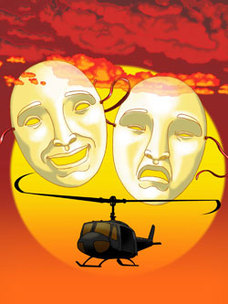 Theater J presents YELLOW FACE By David Henry Hwang Directed by Natsu Onoda Power Featuring Tonya Beckman, Mark Hairston, Stan Kang, Brandon McCoy,Sue Jin Song, Al Twanmo, Rafael Untalan, and Jacob Yeh January 29 - February 23, 2014 Click here to learn more and purchase tickets. About the play: The lines between truth and fiction blur with hilarious and moving results in David Henry Hwang's unreliable memoir. Fresh off his Tony Award win for M. Butterfly, Hwang leads a community protest against the casting of a famous white actor as the Eurasian pimp in the original Broadway production of Miss Saigon, condemning the practice as "yellowface." His position soon comes back to haunt him when he mistakes a Caucasian actor for mixed-race, and casts him in the lead Asian role of his own new play. When Hwang discovers the truth, he tries to conceal his blunder by passing the actor off as a "Siberian Jew." As Hwang struggles to ‘save face’ amidst family politics, international intrigue and government investigations, he explores timeless questions surrounding cultural identity, dual loyalty, and responsibility. A 2008 Pulitzer Prize finalist staged by the visionary director of Astro Boy and God of Comics. “A laugh-out-loud comedy, and an unexpectedly poignant odyssey of self-discovery" --New York Sun Running time: 2 hrs 10 minutes with 15 intermission 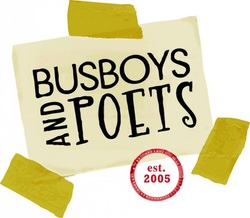 Busboys and Poets is a community gathering place. First established in 2005, Busboys and Poets was created by owner Anas "Andy" Shallal, an Iraqi-American artist, activist and restaurateur. After opening the flagship location at 14th and V Streets, NW (Washington, DC), the neighboring residents and the progressive community embraced Busboys, especially activists opposed to the Iraq War. Busboys and Poets is now located in four distinctive neighborhoods in the Washington Metropolitan area and is a community resource for artists, activists, writers, thinkers and dreamers. 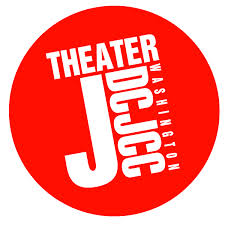 Theater J produces thought-provoking, publicly engaged, personal, passionate and entertaining plays and musicals that celebrate the distinctive urban voice and social vision that are part of the Jewish cultural legacy. Acclaimed as one of the nation’s premier playwrights’ theaters, Theater J presents daring contemporary work alongside spirited revivals and is a nurturing home for the development and production of new work by major writers and emerging artists exploring many of the pressing moral and political issues of our time. Dedicated above all to a pursuit of artistic excellence, Theater J takes its dialogues beyond the stage, offering an array of innovative public discussion forums and outreach programs which explore the theatrical, psychological and social elements of our art. We frequently partner with those of other faiths and communities, stressing the importance of interchange among a great variety of people wishing to take part in frank, humane conversations about conflict and culture.
0 Comments
Your comment will be posted after it is approved.
Leave a Reply. |
My BlogI'm a playwright, dramaturg, and teaching artist. It is here where you'll find my queries and musings on life, theater and the world. My posts advocate for diversity, inclusion, and equity in the American Theatre and updates on my own work. Please enjoy!
Categories
All
Archives
June 2020
Reading List
|
